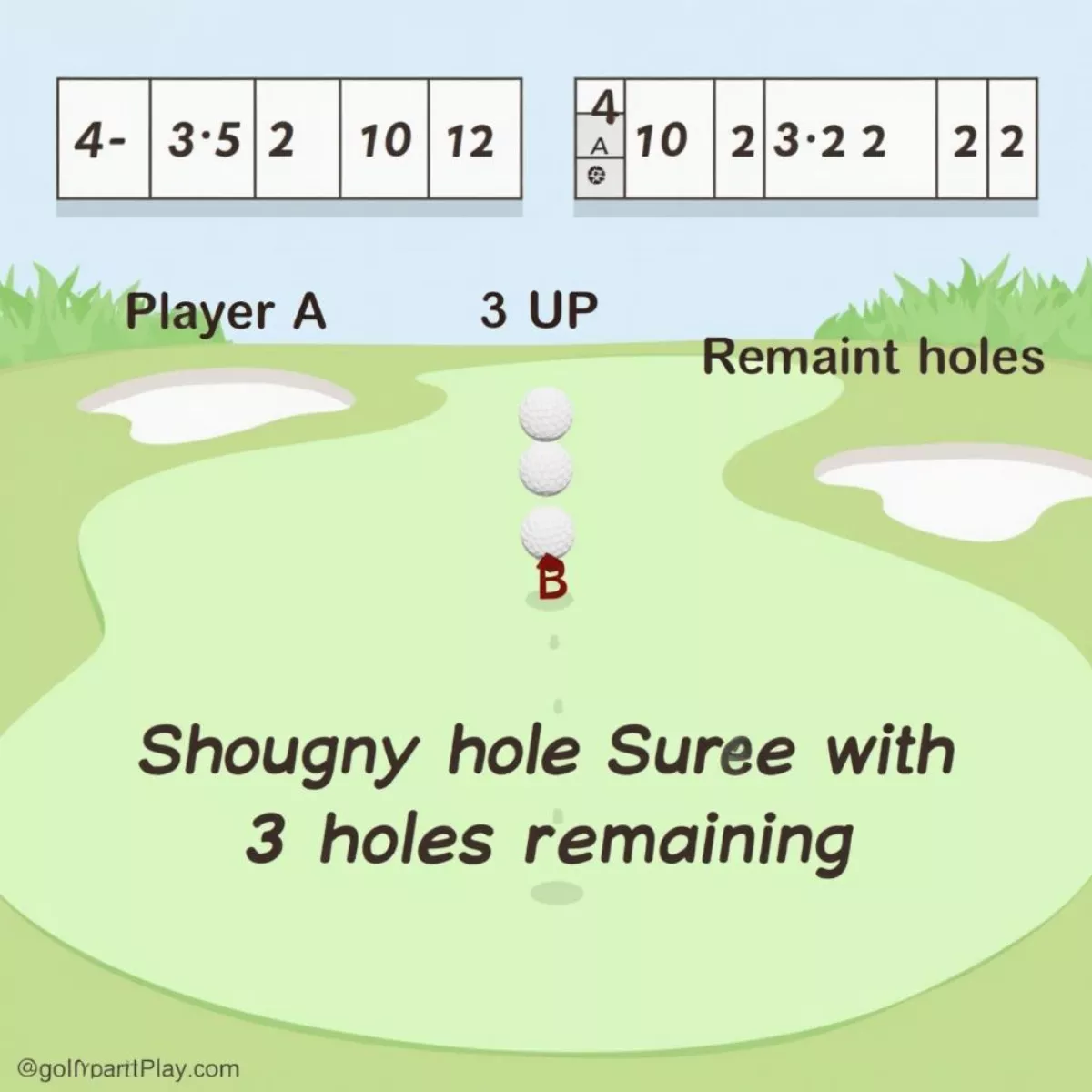Golf, like many sports, is rich in unique terminology that can baffle newcomers and intrigue veterans alike. One term you might have heard during a match is “dormie.” But what does it mean? This article will guide you through the concept of dormie, its significance in golf, and other related insights.
Understanding Dormie in Golf
Definition of Dormie
In the context of golf, particularly in match play, dormie refers to a situation where one player is ahead by the same number of holes left to play. For example, if a player is up three holes with three holes remaining in the match, they are said to be “dormie.” This means the opponent can no longer win the match outright; the best they can do is tie.
Example of Dormie in Action
Imagine you’re playing match play against a friend. If you lead 3 & 3 after the 15th hole, you are dormie. If your opponent wins the next hole, they could only force a tie instead of winning the match, as they can only win a maximum of two holes.
 Golf Dormie Situation
Golf Dormie Situation
Why is Dormie Important?
Understanding dormie is crucial for strategic play. When a player realizes they are dormie, it influences their gameplay.
- Confidence: The dormie position can lead to an increased level of confidence for the player in the lead.
- Pressure: The player who is behind knows they need to win every remaining hole, creating considerable pressure.
Historical Context
The term dormie is derived from a French word, “dormir,” which means “to sleep.” The history suggests that it symbolizes a form of determined closure—when a match is essentially settled, you can “rest” easy knowing the outcome barring a miraculous comeback from your opponent.
Key Strategies for Playing in a Dormie Situation
When you find yourself in a dormie situation—either ahead or behind—certain strategies can help you navigate your game effectively.
If You’re Dormie (In the Lead)
- Stay Calm: Maintain your composure; don’t play too aggressively.
- Play Conservatively: Focus on making smart plays rather than risky moves.
- Manage your Game: Stay focused on the fundamentals (putting, driving, etc.) and avoid unnecessary distractions.
If You’re Behind (Not Dormie)
- Increase Aggression: You need to take risks to win; try to make aggressive plays.
- Focus on One Hole at a Time: Don’t think too far ahead. Concentrate on winning the next hole first.
- Stay Positive: Mental resilience is key; believe you can make a comeback.
 Golfer Under Dormie Pressure
Golfer Under Dormie Pressure
Alternative Terminologies Related to Match Play
In addition to dormie, here are some other terms you might encounter in match play:
- All Square: When both players are tied after completing a certain number of holes.
- Match Play: A format of play where players compete for holes instead of total strokes.
- Front Nine / Back Nine: Referring to the first nine and last nine holes of an 18-hole course.
Quick Reference Table of Match Play Terminology
| Term | Definition |
|---|---|
| Dormie | Ahead by the same number of holes left to play. |
| All Square | Tied match. |
| Match Play | Competing hole by hole instead of by total strokes. |
| Front Nine | First nine holes of an 18-hole course. |
| Back Nine | Last nine holes of an 18-hole course. |
The Impact of Dormie on Competitive Play
In competitive scenarios, understanding the significance of dormie can greatly influence outcomes. Here are some insights:
- Tournaments: Players often find themselves dormie, which adds a layer of challenge and excitement.
- Mental Game: Managing emotions tied to being dormie can change the entire flow of a match.
Notable Examples in Professional Golf
Prominent events have displayed dormie situations to illustrate these dynamics. For instance, during the Ryder Cup or Walker Cup, prolonged stretches of dormie play often leads to dramatically tense moments on the course, affecting players’ psychology and gameplay.
 Professional Golf Dormie Intensity
Professional Golf Dormie Intensity
Key Takeaways
- Dormie means leading by the same number of holes left to play in match play.
- Recognizing you are dormie can change gameplay dynamics, affecting strategies.
- Mental focus, confidence, and strategy are crucial in managing dormie situations.
- Understanding match play terminology enhances your overall knowledge of golf.
Frequently Asked Questions (FAQ)
- What does it mean to be “dormie”?
- Being dormie indicates that you are ahead by the number of holes remaining in a match.
- Can you lose a match if you’re dormie?
- Yes, if you’re dormie and your opponent wins all remaining holes, they can tie you, but cannot win outright.
- Why is the term “dormie” used in golf?
- The term originates from the French word “dormir,” meaning to sleep, reflecting a state of ease or finality in a match situation.
- Is dormie applicable in stroke play?
- No, dormie is a term designated for match play format only.
- What is the best strategy if I’m dormie?
- Play conservatively and focus on smart, calculated shots instead of risky plays.
- What happens if the match ends in a tie?
- If match play ends in a tie, players may result to a tiebreaker or additional holes as stipulated by the rules of the event.
- How does match play scoring differ from stroke play?
- In match play, you win holes; in stroke play, you aim for the lowest total strokes over the entire course.
- Can you be dormie if you’re not winning?
- No, dormie specifically indicates a lead in match play.
- What is the importance of strategy in dormie situations?
- Strategy can help balance aggression and conservativism, which is crucial for maintaining or overcoming a dormie position.
- How can I improve my match play skills?
- Focus on match play strategies, mental training, and closely observe the scoring tactics of experienced players.
With a thorough understanding of what dormie means in golf, you’re now better equipped to enjoy the nuances of match play. So, whether you’re playing competitively or enjoying a friendly round, keep this guide handy to enhance your gameplay experience! Happy golfing!

